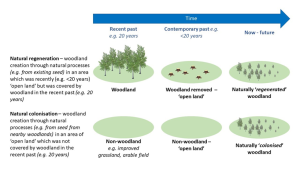Summary
Natural colonisation occurs when tree seed reaches a site and establishes where woodland has not recently existed. This differs from natural regeneration where new trees establish within existing woodland or where woodland has recently been located.

Supporting woodland expansion through such natural processes, is another method with potential to contribute to current tree cover establishment targets. Natural colonisation has several potential benefits including reduced costs, increased biodiversity value and natural matching of trees/genetic stock to sites (Hutchings and Quine, 2021). However, evidence of the full range of outcomes associated with natural colonisation across different sites, and over different timescales is limited. Interdisciplinary studies investigating and quantifying the benefits and dis-benefits of natural colonisation, alongside the attitudes of landowners and managers towards this expansion strategy are lacking.
Research Objectives
Our research addresses these evidence gaps through three strands working on shared range of sites of across land in predominately agricultural contexts:
- Soil and carbon science: will quantify the above ground and below ground carbon sequestration potential of woodland expansion through natural colonisation
- Ecology: specific outcomes (species assemblages and woodland form) to assess the efficacy of natural colonisation as an approach to establish new woodland
- Social science: will characterise land manager attitudes and risk perceptions towards natural colonisation and identify their knowledge and information needs to support this approach
Findings and Recommendations
The research began in 2021/22. A review of existing evidence was completed in 2021 and indicated that:
- Where existing mature woodland and hedgerows or isolated trees provide suitable seed sources and the site conditions are favourable, then natural colonisation provides the potential to expand tree cover relatively quickly (within five years). In other circumstances, there is a risk of little apparent colonisation progress in the short to medium term and the result can be a scrubland rather than woodland habitat. Therefore, natural colonisation depends primarily on choice of site, ground conditions and suitable seed source.
- Natural colonisation by trees and scrub is progressive and, as well as contributing towards increased woodland cover, it can potentially provide complex habitat mosaics of high biodiversity value. The projected biodiversity gains from natural colonisation processes (after first excluding grazers) include highly diverse transitional habitat that could be expected to last for 20 years or more.
- There may also be benefits to long-term carbon sequestration or storage. However, these are yet to be quantified. The unpredictability of natural colonisation may result in it being judged as less reliable in achieving rapid carbon storage when compared to tree planting or direct seeding systems.
Other results from the project are described for each of the science work streams.
Downloads
Funding & Partners
-
 Defra
Defra -
 Forestry Commission
Forestry Commission
